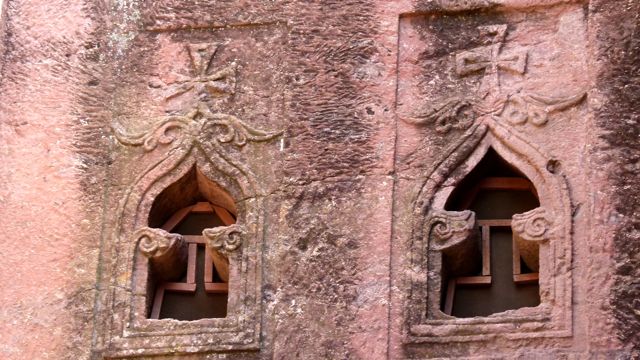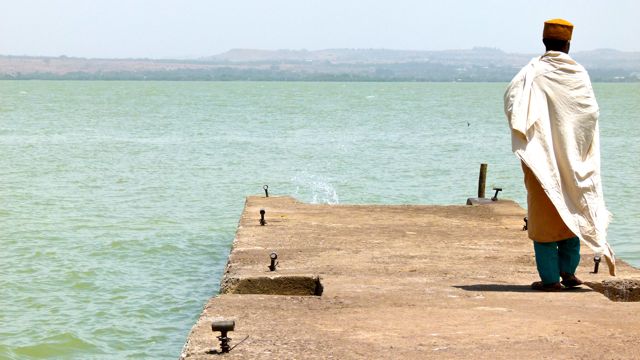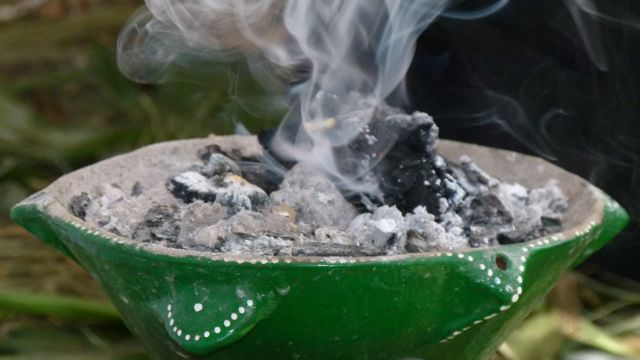Day 82: Leaving Africa
Just before leaving Addis Ababa, I found out that my Sudan visa was denied by the Sudanese embassy in Ethiopia. Sudan makes it very difficult for Americans to visit and we need special invitation from the Ministry of Foreign Affairs to get a visa, unlike every other nationality. It took me four months to arrange an invitation, until my Sudanese visa sponsor screwed up and forgot to send the paperwork to the Sudanese embassy in Addis in time. My only hope of getting a visa was to try at the Sudan-Ethiopia border and charm the Sudanese border officials; otherwise my trip across Africa would’ve been over.
Unexpectedly, my trip to Africa is officially over today, prematurely and short of Cairo. My father, Dr. Kevin Gohar, passed away in his sleep last night in Los Angeles. He was 77 years old. He was healthy and happy, and was out gardening in the afternoon in his lush hillside garden, when he slipped on the steps and hit his head. He had some neck and head pain in the afternoon and went to sleep it off in the evening with some normal pain medication. But he never woke up. He probably had a brain hemorrhage and didn’t even know it. He was a doctor, but never bothered to follow up with doctors regarding his own pain. At least he passed in the night in peace. Sadly, I had a dream a few days ago where I saw my family crying, but I thought nothing of it, even though my dreams often come true. I should’ve known better.
My dad loved gardening more than anything else, and it reminded him of his childhood on a farm in Iran. He was always happy pruning, picking, and tending to his garden, and getting his 3-year-old golden retriever Sunny to chase after the invading squirrels.
He lived a full life, with many ups and down. But I’m pretty sure it ended in an up. He was born in Iran in 1933, the eldest of five sons, one of which died in early adulthood from leukemia, and another in childhood. He worked night and day and paid his own way through university and medical school in Tehran, and came to the US in the early 1960s to do a medical residency in orthopedic surgery in Albany, New York. He married an American woman, Nancy, with whom he had a son, Amir, but they divorced a few years later.
In 1967, he moved back to Iran, met my mom Victoria, married and settled down to have my brother Kourosh and sister Kathy. He had a very successful medical practice in Tehran, and took frequent vacations to Europe with the family in the 1970s, and even visited the Soviet Union in 1972 as a medical expert. He was offered a role in the Shah’s regime, but he turned it down because he didn’t want to be involved in politics. He was a highly regarded doctor in Tehran, and offered his services pro bono to many poor patients who couldn’t afford his surgeries. In return, they gave him pets, goats and vegetables to thank him.
In the turmoil of the Iranian Revolution of 1979, he kept the family safe, even though we were well to do and a target for the revolutionaries. In 1981, he was drafted into the Iranian Army as a surgeon, and was sent to the front lines of the Iran-Iraq war to treat Iranian soldiers injured in the war. In 1982, recognizing that post-revolutionary Iran was not the secular, free Iran in which they grew up in, my parents became determined to emigrate to America, in order to provide us with the same freedom of opportunity that they experienced as youngsters in pre-revolutionary Iran.
Leaving Iran as a family was near impossible in the immediate aftermath of the revolution. The Islamic regime would not give passports to any citizen, rightfully fearing they would escape the country. When a group of doctors went abroad on a medical conference in 1981, all thirty of them traveled on one Iranian passport, with all their names attached to it so that none could defect with proper documentation. Imagine that! But my dad somehow managed to get all five of us our own individual passports – a near impossible feat!
But if leaving revolutionary Iran as a household was difficult, obtaining American residency for an entire Persian family was hopeless in the aftermath of the American hostage crisis. So we separated. My father defected to the US when visiting Chicago on a medical conference at the American Academy of Orthopedic Surgeons, and then went on to New York, my sister accompanied my ailing grandmother to California for hip replacement surgery, my brother started boarding school in Paris because he was denied an American visa, and my mom and I shuttled back and forth between the various locations. Ultimately, my dad moved to Los Angeles – home to a growing émigré Iranian community – and studied to successfully pass the American medical licensure exams in his early 50s and settled down again, back in America after 15 years abroad. He worked terribly hard to build a new life from scratch, having brought nothing with him from Iran, often working at four or more hospitals at a time. He built a successful medical practice in Lakewood, California in the 80s and 90s, and we settled into a normal suburban American existence.
However, despite building a new life from scratch in America, my dad’s American dream was short-lived. He lost his practice as a result of workplace discrimination in the mid 90s, and the ensuing legal battle proved costly, both financially and mentally, and he suffered health-related problems with his hand that would sideline him from practicing surgery ever again. He lost his house and practice, again in his mid-60s, just at a time when people begin to retire and enjoy the good life. He started anew, for the third time in his life, separated from my mom, and developed a modest medical advisory practice in semi-retirement through his 70s.
In his later years, he was very involved in charitable organizations in the US: he helped start and led an Iranian-American Doctors Association in the 80s; he co-founded IMAN – an Iranian-American charitable religious organization; he was instrumental in fundraising for building an Iranian-American cultural center in Los Angeles in the mid-90s; and he was active in his local Rotary Club. Over the last ten years, he had a very popular television show on an Iranian-American channel in Los Angeles, where he would advise patients on their medical problems. People would even call in to his show live from Iran to ask him questions. He was held in high repute in his profession and throughout his adopted community in the US and back in Iran.
Though the last 10 years of his life was difficult financially and professionally, I can honestly say that he was happiest during this time. He had achieved a sort of inner nirvana, reading extensively about spirituality and philosophy, both eastern and western. After having lived half his life in America, he was more American than Persian, and often got along better with Americans because he cared less about Persian social norms and more about being happy personally, regardless of the social consequences in the Persian-American community. I admired him for that.
I learned a lot from him – namely, how to persevere to find solutions to roadblocks, to think spiritually and find personal happiness. He forced me to stand on my two feet at a young age, but he always wanted me to be happy and told me to do whatever that made me happy in life.
We had our differences, and he wasn’t perfect, but we reconciled in the last two years and we developed the best relationship we ever had. I’m grateful that I got to know him in a different light and saw life from his perspective, and I will always be thankful that he led me to find truth in my life – he changed my life, literally. He was a very honorable man who tried his best to provide for his family and for me, in very extenuating circumstances, and for others in his community. I’m incredibly thankful for the special role he played in my life, and he knows that, and knows that he was loved and appreciated, and I know that I was loved.
I’m flying back to the US tonight from Addis Ababa. I suppose it was fate that I never got a Sudanese or Egyptian visa. It just wasn’t meant to be, for now. I’ll finish the trip north to Cairo some other time. Ethiopia wasn’t my favorite country in Africa anyway, but it was very unique and interesting, and this certainly wasn’t how I expected to leave it, or Africa.
I’m not going to leave a lot of commentary on this blog about my travels since Addis Ababa 10 days ago, as I’m sitting at an airport in Mekele, in northern Ethiopia waiting for a flight to connect to Addis and then back to the US for funeral services. The church bells of this university town are ringing, so I find it fitting to leave you some pictures of the rock-carved churches of a beautiful 12th century church town named Lalibela in northern Ethiopia, a world heritage site and the 8th wonder of the world.
Dr. Kevin Gohar is survived by his children, Kourosh, Kathy, Kian and Amir, his two brothers, and my mother Victoria. He loved life, and in the end, he was happy in his garden, and that’s all that matters. May he rest in peace.







































Kian – Thank you for your great blog over the last few months. We met in Kruger and I have lived your dream vicariously ever since. Your commentary and pictures have been exhilerating. The experience of a lifetime…literally. Your tribute to your father shows tremendous insight and I hope you find solace in good mermories of him and the relationship you achieved before it was too late. Safe travel home.
Oh Kian, I’m sorry to hear about your Dad and the early end of your fabulous journey. I’m so enjoyed following your blog and ogling at your amazing photos. Can’t wait to hear about what you do next! Happiness to you… Michelle (Tiff’s best friend)
I knew your Dad, thank you for this wonderful tribute. I enjoyed reading a little more about the man who was my Doctor. Thank you and Peace be with you.